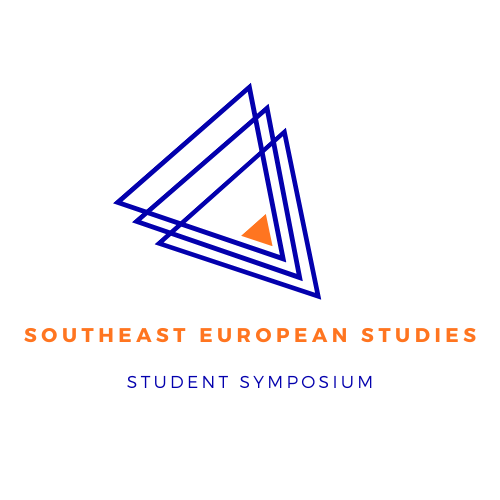Day 3, Room 1
The first panel’s opening presentation featured Katalin Kósza (Regensburg), who explored the emotional landscape within the Hungarian community in Germany. The presentation focused on post-migrant perspectives on identity, tradition and homeland attachment. Katalin gave insights into her qualitative interviews with members of a Hungarian dance club in Munich, prompting a discussion on doing good interviews and building trust and relationships.
Ivana Dinić (Regensburg) discussed the current state of her Master’s thesis on “Coalitional Empowerment in a Peacebuilding Initiative for Young Women from Kosovo and Serbia.” The presentation focused on the dialogue between Serbian and Kosovar women in the OSCE Dialogue Academy for Young Women.
The second panel started with Amina Bahović (Sarajevo) presenting her Bachelor’s thesis “Second Thoughts? A Study of Determinants Influencing Field Changes after Graduation among Recent Graduates of a Political Science Major at a Small University.” Using mixed methods, Amina explored career changes which were important during Covid and the Great Resignation.
Philip Piljić (Graz) touched upon his B.A. thesis about Alija Izetbegović’s Islamic Declaration and the reaction from Yugoslavia and other international agents. He mainly focused on the content of the Declaration and discussed whether it represented any real threats to the Socialist regime in Yugoslavia.
Nikola Donev (Skopje) held a talk titled “North Macedonia: Between Emancipation and Nationalism”. He presented his current research on the effect of schools on national identity-building in North Macedonia after the fall of Yugoslavia. Focusing on school history textbooks, Nikola showed how the narrative of the ‘other’ has been constructed.
Day 3, Room 2
With Konstantinos Katiniotis (Piraeus), who opened it with his presentation “NATO’s Enlargement to Eastern Europe and Ukraine: Consequences for Southeastern Europe”. He delved into the historical background of NATO and its enlargement, particularly focusing on its implications for Southeastern Europe. As part of the historical background, he highlighted the geostrategic significance of Greece and Turkey within NATO and discussed the challenges posed by the Yugoslav Wars. Despite ongoing interstate disputes, Konstantinos argued that NATO’s presence has contributed to stabilising Southeastern Europe.
Kejda Mihai’s (Piraeus) presentation “The SEE Dimension on Ukraine’s Public Diplomacy Strategy During the Russian-Ukrainian War of 2022” examined Ukraine’s public diplomacy strategy amid Russia’s full-scale war of aggression, emphasising Ukraine’s efforts to distinguish itself from Russia. Kejda outlined Ukraine’s diplomatic initiatives, including enhanced interparliamentary contacts and cultural diplomacy with Balkan countries, aimed at countering Russian influence and integrating into the EU and NATO.
Day 3, Room 1
Aleksandra Tomanić, Executive Director of the European Fund for the Balkans, gave insights into her professional biography. With a background that includes tenure at the European Commission’s DG Enlargement and the esteemed German Development Cooperation (GIZ).
In summary, the second edition of the SEES Student Symposium successfully achieved its goal of bringing together students passionate about Southeast Europe. The presentations sparked productive discussions, and the keynote and workshops provided valuable insights, fostering new connections with wonderful people from different countries and fields of research.

